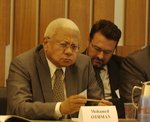Mohamed OTHMAN
contribution 10 -
OTHMAN Mohamed

original version
Two or three things concerning guilty pleas, and then maybe to situate Kambanda also. I think there are two areas of importance in the guilty plea process between the Defence and the Prosecution. One is when you are establishing the agreed facts. There is always tension between the Prosecution and the Defence when you are establishing the agred facts that constitutes the crime in which the person is pleading guilty. And here, of course, within the Tribunal, there is a lesser margin of dropping charges than you have in the American system of plea bargaining.
Secondly, of course, it comes to the range of sentences, which, again within the Tribunal system, is not binding to the Judges. I think in the Tribunal model, the key issue is the question of mitigation and where do you place this mitigation as a factor in sentencing. Clearly, within the Tribunal the Judges have absolute discretion in that.
In the US system of plea bargaining, there is prior contact between the parties and the Judges before the hearing of a guilty plea. Within the Tribunal system, it will be contempt of court in fact, for the parties to have any prior discussion with the Judges to get an indication of their sentencing range. But within the American plea bargaining system, they have gone over that in terms of having that possibility that the Judges can express, prior to the hearing, that range of sentence so that you give a possibility for the Accused to come out of that agreement.
I just want to situate betwen plea bargaining and the US system. But we have not incorporated fully. I think there is some element positive. Not everything. The plea agreement is one area where we have picked up procedurally from the US criminal procedure.
Just to link it up now to the Kambanda situation. I think definitely, of course, the timing of his guilty plea had a factor. I think it was the first time the Tribunal was handing over a sentence to somebody who was a former prime minister. Again, accepting a plea of genocide. But definitely, as you said correctly, the Prosecution had demanded a life sentence. But there was within the plea agreement a safety valve, and that safety valve was: Would he, after that sentence, cooperate? We don’t have a system where the sentence is postponed until the person delivers that cooperation. So there was no guarantee that if he would have a lesser sentence he would cooperate in the end. What would happen if he negates on the cooperation after sentencing? So that was one dilemma when the decision was taken.
But there were a lot of things. I think it was the first experience for most of us. Clearly, as Mr. Muna mentioned, a conflict of systems, because one of the key issues that was held, and it certainly was his position, again, the crime of genocide, was the question whether or not he had expressed no remorse. Definitely, when he was given an opportunity, he said nothing, but the question of remorse was already a provision in the plea agreement.
So that could not have been challenged because it was accepted in evidence that he had given remorse by a clear provision in the plea agreement, and then secondly, of course, his Defence counsel. But, again, as I said, we learn as we go by in the sense that, for example, in the Yugoslavia Tribunal, in the Plavsic case, Madeleine Albright had come to give testimony in mitigation in terms of expressing what position he had.
In the Tribunal, we took it that Kambanda was the prime minister. But his Defence, Michael English, was very clear. What kind of prime minister? He said, "Very clearly we are talking of a prime minister who was a puppet. Strings," he said, "something that could be pulled, and he danced, and so on." But there was nobody to come in to give evidence in support of that in terms of mitigation.
I think the mitigation process and how we enforce it, and so on, is one of the key areas probably that this process would help to clarify things.
A. GARAPON
Thank you. I believe the Kambanda matter has been clarified and I will turn now to the Defence team to respond in respect of acquittals.

